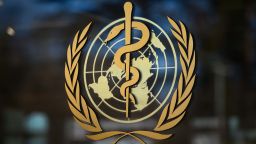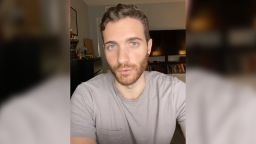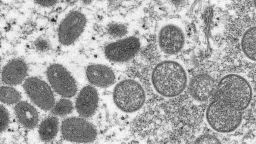As monkeypox cases continue to rise globally, the World Health Organization plans to reassess whether the outbreak constitutes a public health emergency of international concern.
In late June, WHO’s Emergency Committee determined that the outbreak did not meet the criteria for such a declaration.
But as the virus continues to spread, WHO Director-General Tedros Adhanom Ghebreyesus wants the committee to take up the issue again, based on the latest data around the epidemiology and evolution of the outbreak.
Tedros said Wednesday that he will convene the committee during the week of July 18, or sooner if needed.
WHO defines a public health emergency of international concern, or PHEIC, as “an extraordinary event” that constitutes a “public health risk to other States through the international spread of disease” and that may “potentially require a coordinated international response.”
“On monkeypox, I continue to be concerned by the scale and spread of the virus. Across the world, there has now been more than 6,000 cases recorded in 58 countries,” Tedros said.
“Testing remains a challenge, and it’s highly probable that there are a significant number of cases not being picked up,” he added. “Europe is the current epicenter of the outbreak, recording more than 80% of cases globally.”
Monkeypox, a viral disease, occurs mostly in central and western Africa, where the virus is endemic – but as part of the latest outbreak, the virus has spread to many regions of the world where it is not typically seen.
Cases are also being reported in African countries that previously were not affected by the virus, and in those places where the virus is endemic, record numbers are being recorded, Tedros said Wednesday. WHO teams are following the data closely, he said.
WHO is working with countries and vaccine manufacturers to coordinate sharing of vaccines for monkeypox, which are scarce. The organization is also working with groups to break the stigma around the virus and spread information to help protect people.
“I want to particularly commend those that are sharing videos online via social media channels, talking about their symptoms and experiences with monkeypox,” he said. “This is a positive way to break down the stigma about a virus that can affect anyone.”
Early data on the outbreak has suggested that gay and bisexual men and other men who have sex with men make up a high number of reported cases, leading to concern about stigmatizing the disease and the LGBTQ community.
However, anyone who has been in close contact with someone who has the virus can be at risk.
The monkeypox virus can spread from person to person through direct contact with infectious body fluids or with the rash, scabs and sores that the disease can cause. Spread can also happen through indirect contact, such as through clothing or bedding contaminated with the virus.
It can also spread through respiratory secretions during prolonged face-to-face contact or during intimate physical contact, such as kissing, cuddling or sex.
Symptoms of monkeypox can include fever, headache, muscle aches, swollen lymph nodes, chills, exhaustion and a rash on the skin that can look like pimples or blisters.
The rash goes through different stages, developing into pustules before healing.
About 41,500 courses of vaccine distributed in US
About 41,500 courses of the monkeypox vaccine Jynneos have been distributed to states and other jurisdictions across the United States, according to data published Wednesday by the US Department of Health and Human Services.
A course of Jynneos involves two doses four weeks apart.
The Biden administration announced last week that the strategy for distributing monkeypox vaccines would focus on areas with the highest case rates and overall risk. The District of Columbia has the most reported cases per capita, by far, and has received the most vaccine doses per capita, the new HHS data shows.
Vaccine distribution has also been heavily concentrated in California, Illinois and New York, particularly the three largest US cities: New York, Los Angeles and Chicago.
Massachusetts, Hawaii and Colorado also received a large share of the vaccine distribution to date.
Eleven states have not received any monkeypox vaccine, according to the data; none of them has reported any cases to the CDC.
US monkeypox testing ramps up
Efforts are also underway to ramp up testing for the virus in the US.
The commercial laboratory company Labcorp will begin monkeypox testing Wednesday at its largest facility in the United States, doubling the nation’s capacity to test for the virus, according to the US Centers for Disease Control and Prevention.
The CDC announced Wednesday that Labcorp will be able to accept specimens for testing from anywhere in the United States, and the company expects to perform up to 10,000 tests per week.
The outbreak has led to 605 probable or confirmed cases in the US as of Wednesday evening. Cases have been reported in 34 states, the District of Columbia and Puerto Rico. Three of the cases were non-US residents.
“The ability of commercial labs to test for monkeypox is a key pillar in our comprehensive strategy to combat this disease,” CDC Director Dr. Rochelle Walensky said Wednesday. “This will not only increase testing capacity but will make it more convenient for providers and patients to access tests by using existing provider-to-lab relationships.”
If someone thinks they could have a monkeypox infection, a provider will have to order a test. “The public will not be able to go to a Labcorp lab and submit a specimen,” the CDC said in its statement.
Get CNN Health's weekly newsletter
Sign up here to get The Results Are In with Dr. Sanjay Gupta every Tuesday from the CNN Health team.
The CDC’s Laboratory Response Network has been conducting most of the monkeypox-specific testing in the US, but on June 22, the US Department of Health and Human Services announced that monkeypox testing would expand to five commercial labs: Aegis Science, Labcorp, Mayo Clinic Laboratories, Quest Diagnostics and Sonic Healthcare.
The CDC confirmed Wednesday that it had shipped tests to the labs and that their employees have been trained on how to administer the tests. “CDC anticipates additional commercial laboratories will come online and monkeypox testing capacity will continue to increase throughout the month of July.”
CNN’s Deidre McPhillips and Naomi Thomas contributed to this report.







